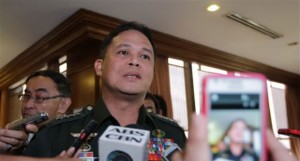AFP operations eyed to rescue 2 seized Germans
MANILA, Philippines–The military has not abandoned its operations to rescue the two German nationals who are being held hostage by the Abu Sayyaf terrorist group in Sulu despite ongoing negotiations for their release, Armed Forces of the Philippines Chief Gen. Gregorio Catapang said on Wednesday.
Catapang said the AFP continued to provide support to the Philippine National Police in dealing with the situation and that military intelligence operatives were continuously working on it.
“There were plans to rescue them although the chances of success were very slim so we decided not to push it,” he said.
“We cannot just go there, do the rescue and then all of a sudden those who will be rescued will be part of the collateral damage,” he stressed.
Real threat
Article continues after this advertisementCatapang acknowledged as real the Abu Sayyaf threat to behead the hostages if its demand for a P250-million ransom would not be met by Oct. 10.
Article continues after this advertisement“We are trying to analyze the situation on which should be prioritized, rescue or negotiations. What we are seeing now is continuous negotiations and we were told that they (hostages) are still alive,” he stressed.
The AFP chief said the German embassy in Manila was negotiating with the kidnappers for the release of the hostages.
He said the hostages were being held in Indanan, Sulu, but had to be cautious in its rescue plan.
Catapang said that Defense Secretary Voltaire Gazmin’s marching orders were to run after the Abu Sayyaf group that was why he was deploying more Army and Marine soldiers to the area.
‘We have to do it’
“Secretary Gazmin said we should continue looking after the hostages, and if there is a chance that we can get them, rescue them without collateral damage, then we have to do it,” he added.
The hostages—74-year-old Stefan Viktor Okonek and 42-year-old Henrite Dielen—were allowed to speak over Radio Mindanao Network (RMN)’s station dxRZ by their captors to appeal as their condition in the jungle of Sulu continues to worsen.
Both Okonek and Dielen said they feared contracting tropical diseases like malaria.
